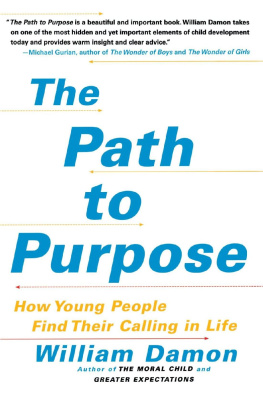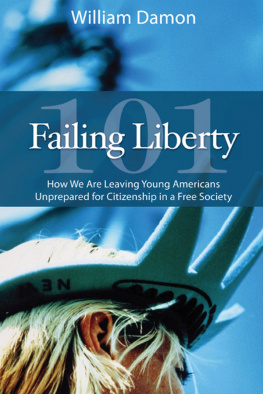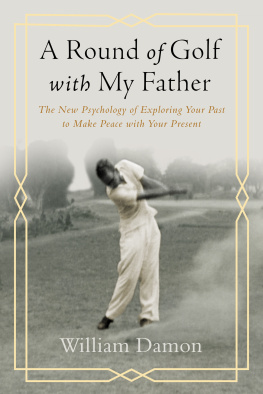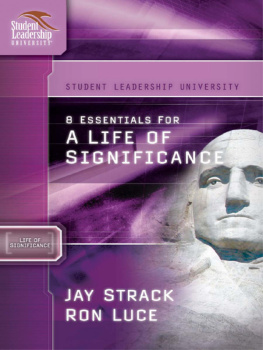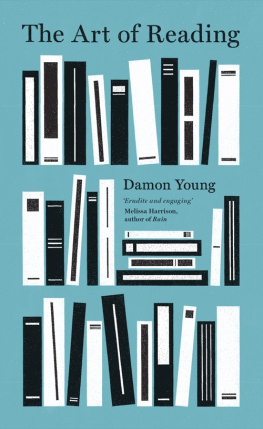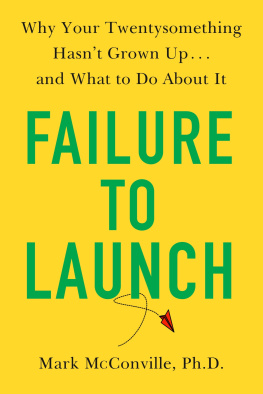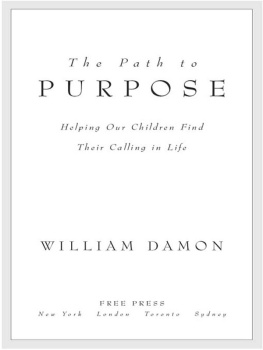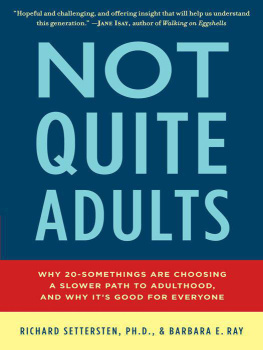ABOUT THE AUTHOR
W ILLIAM D AMON is one of the worlds leading scholars of human development. He is professor of education and Director of the Center on Adolescence at Stanford University. Prior to coming to Stanford in 1997, Damon was University Professor and Director of the Center for the Study of Human Development at Brown University. He speaks regularly to public and academic groups about contemporary trends in child development, and he has written widely about personal development and moral commitment at all ages of life. His books include The Moral Child, Some Do Care, Greater Expectations, The Youth Charter, and Good Work . He is founding editor of the well-known series New Directions for Child and Adolescent Development and editor in chief of The Handbook of Child Psychology, 5th and 6th editions. Among other national recognitions, he was recently elected to the National Academy of Education. Damon lives in Northern California.
APPENDIX: Questionnaire from the Youth Purpose Study
Authors note: This is the questionnaire we used in interviewing young people for the Youth Purpose Study. Such questions may be of interest as starting points for launching conversations that can help to identify young peoples interests and guide them.
I. Introduction:
- a. Tell me a little about yourself. What kind of person are you?
- b. What kinds of things do you really care about? Why do you care about these things?
- c. Whats most important to you in your life? Why is that important to you?
This is the form of the interview that our research team used in the initial wave of studies (20032006) discussed in this book. We have revised and updated the interview for follow-up studies that we are now conducting. We also have developed a survey method for sampling large numbers of young people. Researchers who are interested in obtaining details of our current methods may request them by e-mailing to Lisa Staton (staton@stanford.edu).
- d. Do you have any long-term goals? What are a few of the more important ones? Why are these goals important to you?
If no, Thats interesting, why do you prefer not to have goals? / What does it mean to you not to have goals?
If yes, Are you doing anything now to achieve these goals or objectives? If yes, What are you doing? If no, What has kept you back from doing something to meet these goals?
- e. What does it mean to have a good life?
- f. What does it mean to be a good person?
- g. What would you say you spend most of your energy on these days?
- h. If you were looking back on your life, how would you want to be remembered? What would you want to be remembered for? Why?
II. Inspiration of purpose/formative experiences:
- a. Earlier you talked about [x] being important to you. Can you tell me how and why this became important? When did it become important to you?
- b. Why did you get involved with this particular objective or cause rather than with a different one?
- c. Is there someone who helped you act on your goal(s) initially?
- d. Would you say your friends and family are concerned with the same things? Have your friends, family and other people in your life generally supported or opposed your efforts?
- e. Have you gotten others involved in your efforts? If yes, how did you do this?
- f. Apart from particular people, were there other things that influenced you (books, films, particular experiences, or other things)?
III. Opportunities and supports for maintenance of purpose:
- a. Do you look up to anyone?
- b. Do you have a mentor? Are there qualities in this mentor, or in others, that you admire?
IV. Obstacles, pressures and rewards:
- a. Has it been hard for you to remain dedicated to this aim? Will it be difficult for you to remain committed down the road?
- b. ( If yes to a ) What were the obstacles? How did you overcome them?
V. Future goals and responsibilities:
- a. Are there qualities that you possess that helped you in achieving the goals that are important to you? Are there qualities that you possess that have made it more difficult?
- b. Picture yourself at, say, 40 years of age. What will you be doing? Who will be in your life? What will be important to you? What will be going on in the area that concerns you?
- c. What are your plans in the immediate future, say the next few years?
VI. Categories of purpose:
- a. Tell me about your friends and family.
- b. How important are they to you relative to the other things in your life? Why?
- c. Do you want to have a family of your own someday? Why? How important is that to you? Why?
- d. Do you do anything special to show your family or friends that they are important to you? If yes, what do you do? Why?
- e. What role does religion, faith, spirituality, or God play in your life, if any? Are you active in a church or organized religion? What kinds of things do you do there?
- f. Is your community important to you? How does it play a role in your life? Do you do anything to help improve your community? Do you do any community service? If yes, what do you do? Why do you do it?
- g. Are you an American citizen? What does it mean to you to be a citizen? Is it important to you to be a citizen? Why or why not?
- h. When you get older, what kind of work would you like to do? Why? Will your career be important to you? Why? How important will it be? Why? Are you doing anything now to prepare you for your lifes work/career?
VII. Closing:
- a. Were coming to the end of the interview; is there anything you would like to add about whats important to you or what you are trying to accomplish in life?
- b. Summing up, what do you think matters most to you at this time? Will that still matter most to you as you get older? Why/Why not?
ACKNOWLEDGMENTS
My first words of thanks go to Arthur Schwartz, who encouraged my studies in youth purpose from the start and who has been a true partner in shaping the ideas at the center of the project. In addition to Arthurs advice, the John Templeton Foundation has supported the project in a most beneficent way that has provided not only generous material support but also a welcome source of inspiration. I thank Sir John Templeton, John M. Templeton Jr., and Charles L. Harper, Jr., for the many insights they have given me over the years. The other superb organization that has provided this work with invaluable support is the Thrive Foundation for Youth, and I offer my warmest thanks to Bob and Dottie King and to Cynthia King-Guffey for all that the foundation has done to make possible this and other research that I have conducted in positive youth development. An early version of my discussion of development in Chapter 2 of this book was first posted in the Thoughts on Thriving section of the foundations Web site (http://www.thrivefoundation.org). I also thank Pam King for her many excellent contributions to these research efforts and the entire King family for their friendship.
Over the past seven years, I have had the opportunity to discuss my progress on this project with an extraordinarily talented group of developmental scholars assembled at least twice a year by the Thrive Foundation for Youth. The scholars in the Forum on Thriving have included Peter Benson, Peter Scales, Linda Wagener, Jim Furrow, Pam King, Richard Lerner, and Duncan Campbell. I thank all of them for their feedback and many intellectual contributions to my understanding of youth purpose.

